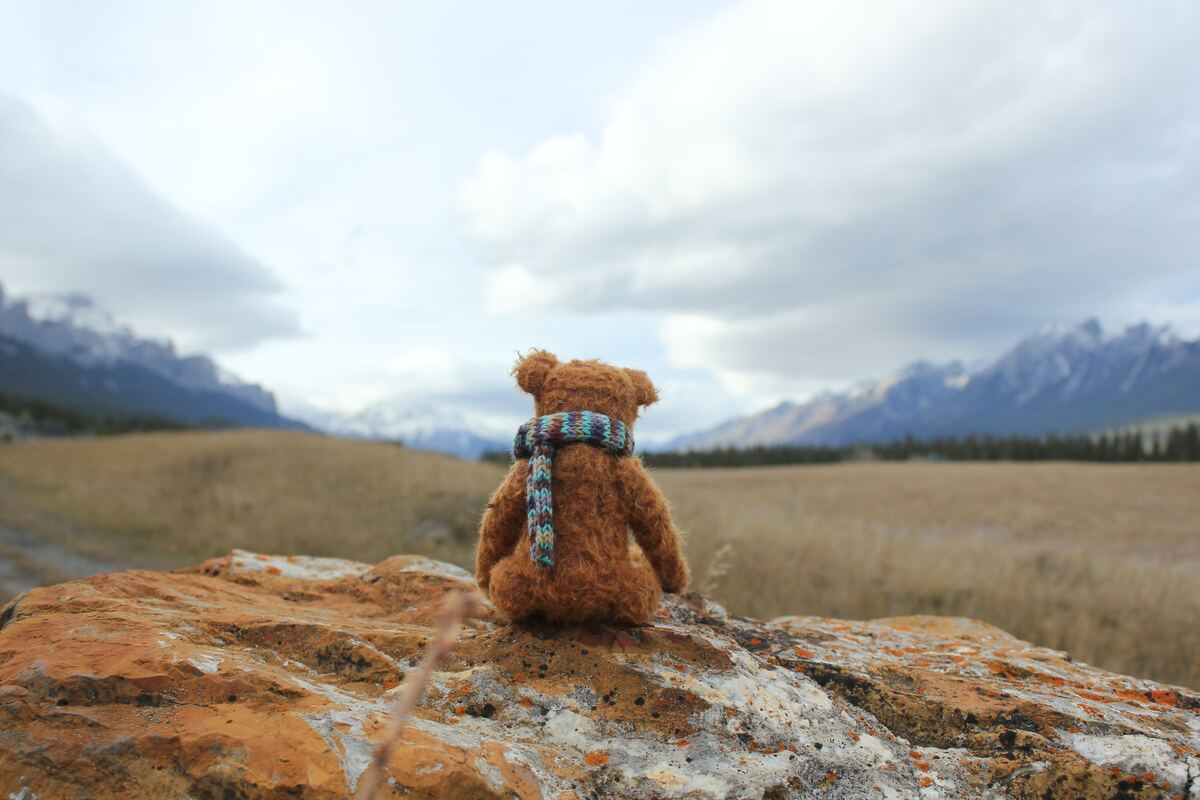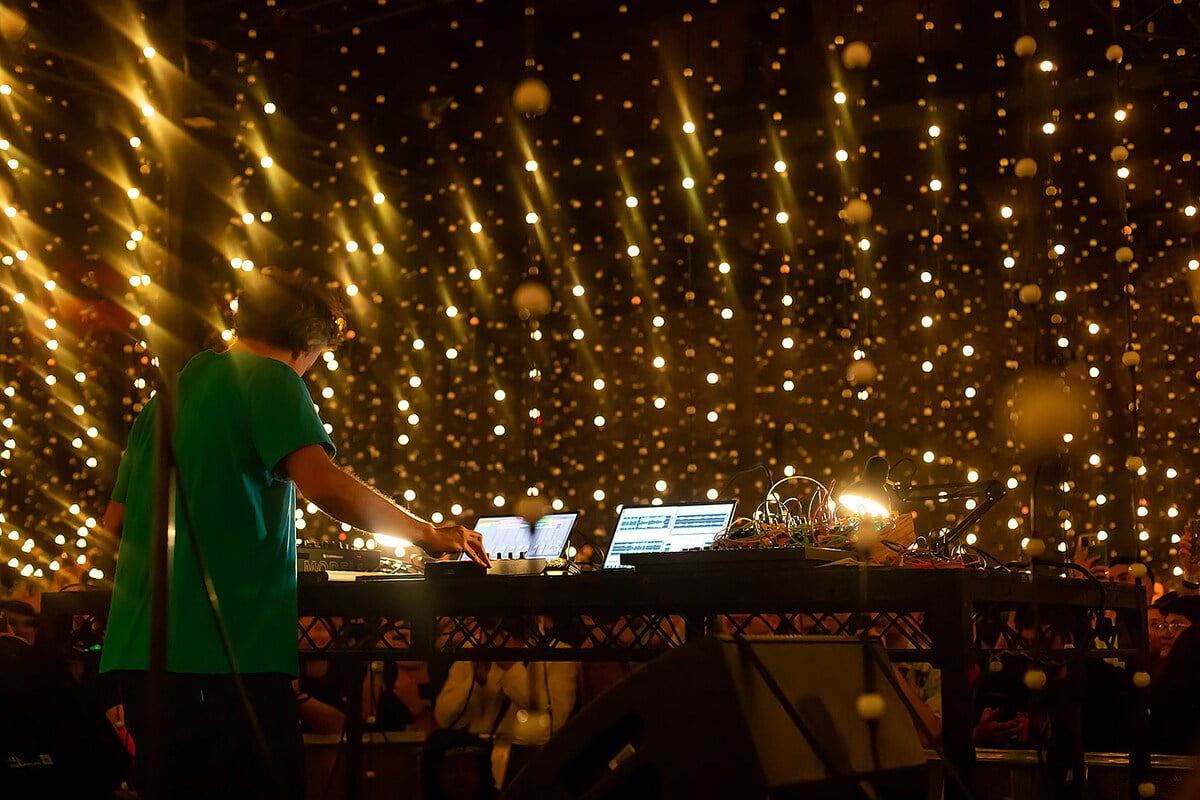I’ve made a commitment to myself that, for the next six months, I am pausing all income-generating pursuits.
That’s a big deal for me to say, and even bigger deal to state it publicly.
I started my first “business” when I was eight years old. I would write short stories on index cards, draw a cover on a piece of thick cardboard, sew together the pages and cover together like a book binding, and then sell it to my parents for $1 (luckily, I had stumbled upon an audience that was happy to pay for my work).
Truly, I consider myself unemployable — the few times I’ve held a job, working for someone else, I was depressed and miserable.
Freedom and autonomy are essential for me. I don’t compromise on them. If I do, my mental health suffers.
Since PyImageSearch was acquired in September 2021, I’ve vetted nine separate business ideas.
All of them had some level of traction, three of which were quickly generating revenue.
But each time, my heart wasn’t in it — the magic just wasn’t there like it used to be.
The reason why NaturalDisasters.ai exists is because I want to get back to basics, and focus on how I want to feel doing “work” rather than the amount of money it makes.
Because, truthfully, I don’t need any more money.
The fact that I think I do is just money scarcity, caused by old childhood wounds growing up in a family where money was always something my parents fought over.
I can monetize just about anything, and I fully trust my ability to look at an opportunity and figure out a way to make money from it.
But feeling excited, motivated, and passionate about what I’m doing?
Since PyImageSearch, that’s a different story entirely, and manifesting that level of feeling requires meticulous care and cultivation and my part.
So, to make a long story short:
“No, NaturalDisasters.ai will not be monetized anytime soon, if ever.”
The reason behind such a strict stance requires a bit more context.
I haven’t found my next passion, my “why”, my reason for being
 I have yet to find my next passion (image credit)
I have yet to find my next passion (image credit)
It’s not that I don’t want to build another business.
I do.
Desperately.
It’s just that:
- I can tell I need rest. Despite selling my previous business two years ago, my body and nervous system are still recovering from a lifetime of stress, and I’m not back to 100% yet. I just don’t have the stamina (currently) to handle the adversity it takes to build and run another successful business.
- I haven’t found my next passion, my reason, my why. The reason I worked so hard on my previous business was to address a core childhood wound — my family never had enough money. Our financial woes contributed to domestic violence, and, as a result, I found myself seeking financial independence to ensure the situation that happened in my childhood never occurred in my adulthood.
Having a proper why is important.
Without it, you can’t withstand the extreme volatility of being a business owner.
I have yet to find my next “why”.
But it’s coming, I can feel it.
And I strongly sense that this personal blog will play a big part in me uncovering my “why”.
I’m an entrepreneur, and it’s in my blood to build and sell shit
I’m good at building, and I like the feeling of selling what I build.
When I create a product with my bare hands, and then someone rationally trades their hard-earned money for it, the feeling it creates inside me is both validating and intoxicating.
I crave that feeling.
To that end, I know at some point in the next six months I will be tempted to monetize NaturalDisasters.ai.
Instead of pretending that these intrusive monetization thoughts won’t occur (which they will, and they have happened already), I’m instead opting to get ahead of it.
My goal in authoring this article is to:
- Clear my conscious of any monetization thoughts
- Remind myself that I’m focusing on the feeling of creation rather than making money
- Reinforce my intention of using my expertise in AI to help others affected my natural disasters
- Pledge to myself that I won’t turn this blog into an info product/education business, which, legally, I’m not allowed to do anyway since that would be a violation of my non-compete from the sale of PyImageSearch
And honestly, I love the new owners of PyImageSearch. They are great people, and I feel so lucky to know that the business I founded and ran for eight years is in good hands.
Additionally, the new owners are also successful entrepreneurs — we bat around future business ideas every few months. It’s reasonable to think that we may one day work together again.
Why on earth would I want to harm them, or the company I founded, ran, and loved so dearly for eight years?
NaturalDisasters.ai is a personal site, and that’s how I like it.
Monetization can come later, if it ever comes at all.
That said, in a strange way, NaturalDisasters.ai reminds me of the early days of PyImageSearch.
PyImageSearch: Born from a place of self-frustration
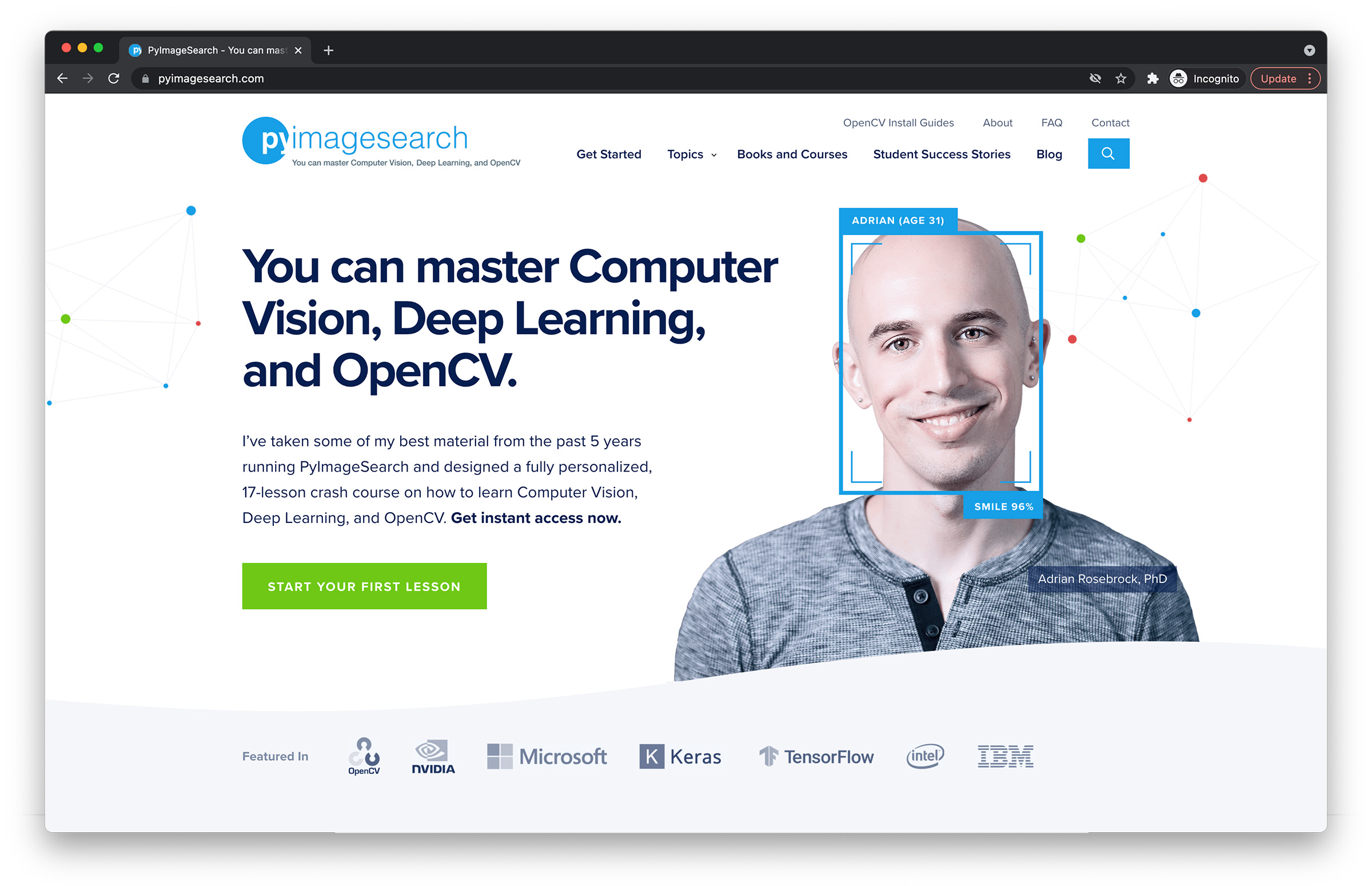
Most people don’t know this, but PyImageSearch was started out of annoyance and frustration…namely with myself.
A bit of backstory:
I’ve been building and launching businesses at a professional level since I was 19.
In college, I launched two income-generating iPhone apps in the computer vision and artificial intelligence space.
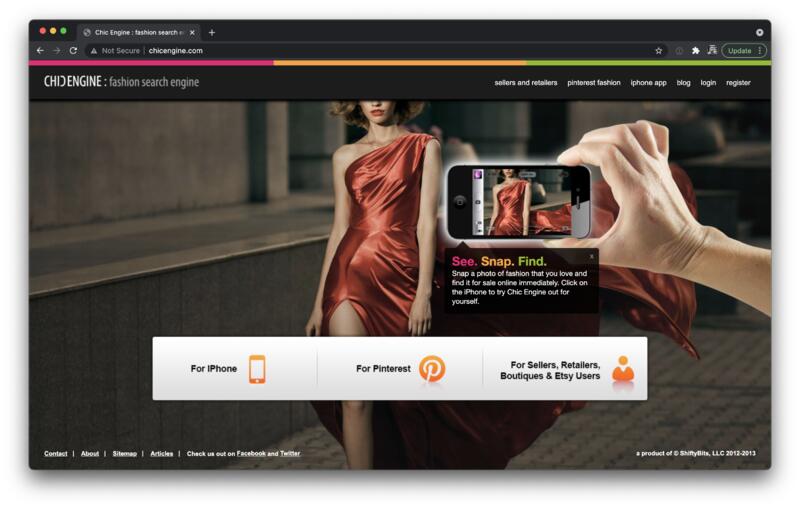
The first was Chic Engine, a visual fashion search engine, where users could take a photo of fashion in magazines, billboards, pieces there friends were wearing, etc., and the AI algorithm powering the app would find similar items online for purchase.
The app was predominately monetized via affiliate relationships and paid search results.
Chic Engine made enough money to make my car payment each month.
The second iPhone app I launched was ID My Pill, an iPhone app that recognized prescription medication in a snap of your smartphone’s camera.
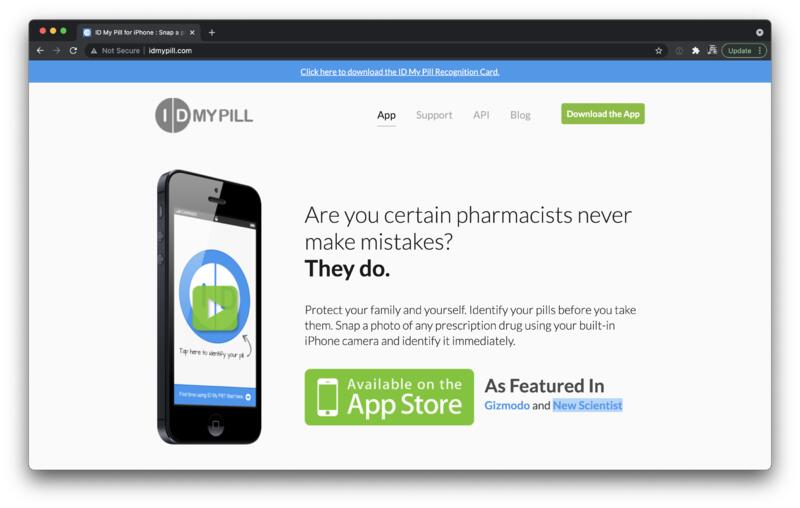
Each year, over one million injuries and deaths happen due to patients taking the incorrect medication, whether the doctor prescribed the wrong medication, the pharmacist filled it incorrectly, or the patient simply confused the medication with another one they were taking.
ID My Pill helped solve the problem by providing a way for patients to visually validate that they were indeed taking the correct medication.
ID My Pill made enough money to cover my rent, but not much more.
I truly believe it could have grown further, especially with our white labeled API service we released soon after the iPhone app, but if I’m being honest with myself, I was biting off way more than I could chew.
And realistically, no one in the pharmaceutical industry was going to trust a 20 year old kid doing prescription pill recognition (at least not without prior connections in the pharma world, which I simply didn’t have).
When I assessed both Chic Engine and ID My Pill, I realized that my ambitions were too large for my business skill level at the time — I simply didn’t have mastery level of the basics yet.
I was frustrated and disappointed with myself for falling into the engineer/programmer trap of building something because I thought it would be fun and challenging without first ensuring:
- There was a market for the product
- I had the proper connections and ability to bring the product to market
The result is that I felt I wasted a bunch of time during my early college years.
My big takeaway was that I needed to learn critical skills like market validation, copy writing, email marketing, etc.
I started PyImageSearch so I could teach myself those skills, and gain real-world experience doing them.
PyImageSearch’s unexpected rise in the AI education space
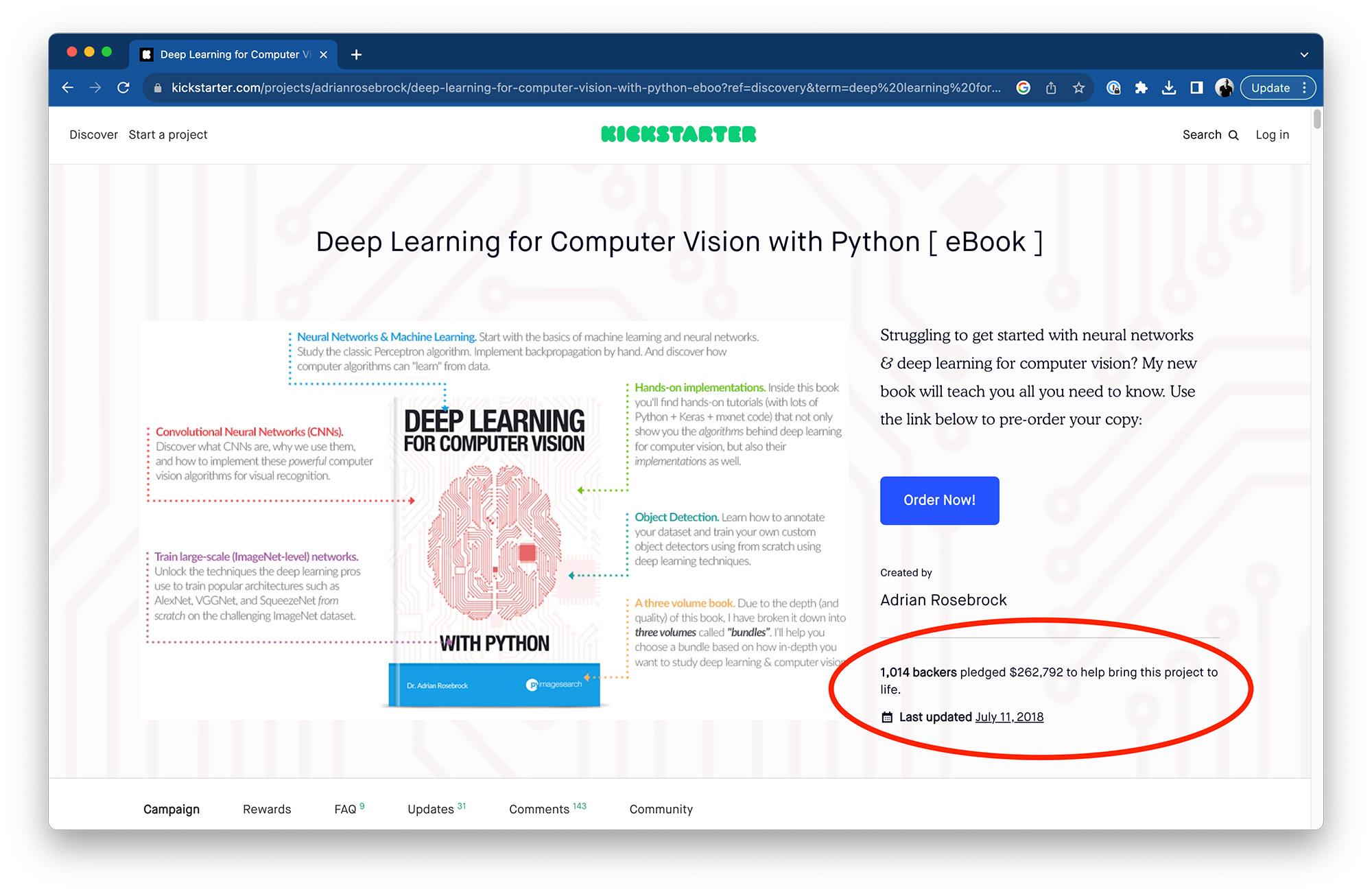 The Deep Learning for Computer Vision with Python Kickstarter campaign was a huge early win for PyImageSearch, bringing in $262,792 in under 30 days.
The Deep Learning for Computer Vision with Python Kickstarter campaign was a huge early win for PyImageSearch, bringing in $262,792 in under 30 days.
PyImageSearch was never meant to grow as large as it did.
If anything, expectations of the business were quite humble.
My goal was to:
- Start authoring free tutorials on computer vision, machine learning, and OpenCV
- Drive traffic to the site via Google and SEO
- Build an email list
- Author a few books, based on what my subscribers wanted to learn out (i.e., market validation)
- Grow the business to $10K/month in revenue (enough for me to live well on)
- Parlay the experience I gained, and the audience I built, into some sort of AI-based SaaS app (which is where I believed the real money would have been made)
Turns out, I never got to the SaaS app. PyImageSearch was the thing that made the real money.
Magic happens when we’re deeply passionate about something
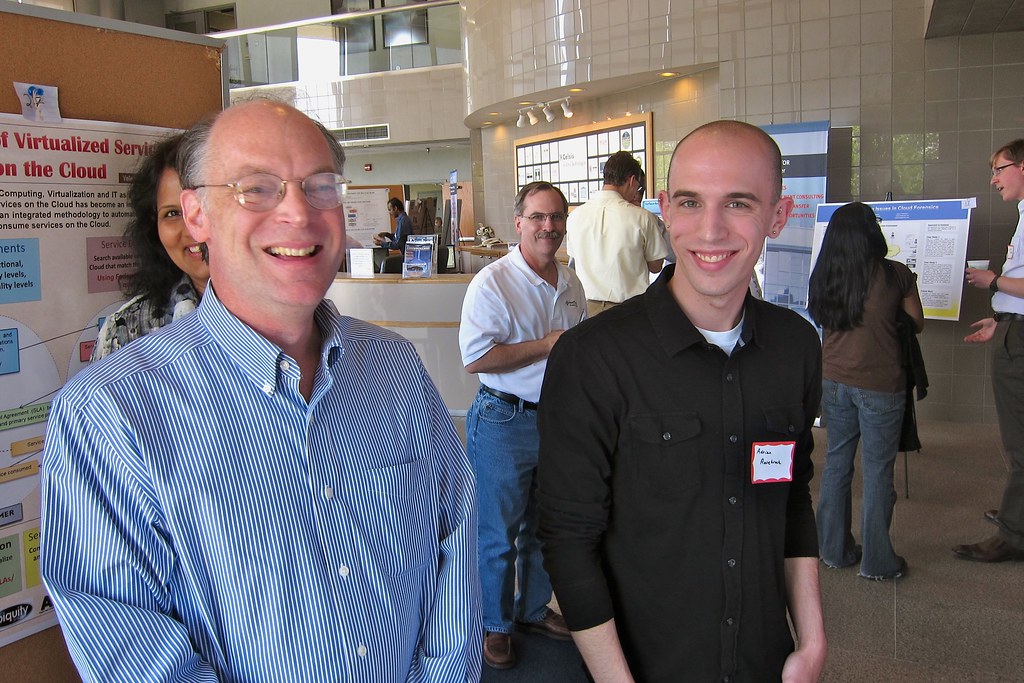 Myself next to Dr. Alan Sherman, presenting a research paper.
Myself next to Dr. Alan Sherman, presenting a research paper.
PyImageSearch was successful because I was both passionate and committed to it.
By admitting my shortcomings in my entrepreneurial/business knowledge, I was able to address them, and as a result, I created a highly successful business.
I’m getting the same sort of vibes from running NaturalDisasters.ai.
Clearly, money isn’t what’s motivating me right now — I don’t “need” more money.
But what I do need is passion and purpose, and more to the point, feeling excited to wake up in the morning to both create and build.
NaturalDisasters.ai is helping address that chronic need.
I’m using this blog to help me find my “next thing”.
Hell, maybe it is my next thing.
Or, perhaps it’s just another stepping stone, one of many since the PyImageSearch acquisition in 2021.
Either way, it doesn’t matter:
This experience is all part of the journey, and I’m attempting to channel the courage within myself to place one foot in front of the other until I stumble on the next that gives me unbridled passion and purpose.
I know I’ll get there.
Monetizing PyImageSearch with books and courses
During my eight years running PyImageSearch, I authored over 500+ blog posts, driving absolutely incredible amounts of traffic via Google.
Most articles I published, especially after year three, were heavily keyword researched.
In fact, PyImageSearch’s SEO was so good and our backlink reputation so strong, that I could author a tutorial on a particular AI topic, and by the next day, the article was ranking number one in Google for the keywords I was targeting.
It was a wild experience.
The sheer amount of traffic coming from Google made it straightforward to:
- Build an email list
- Validate book and course ideas
- Author the validated books/courses
- Sell them
- Rinse and repeat
And when I combined the above with my newfound love of marketing, particularly copywriting and email marketing, the business grew rapidly.
And best of all, our readers were getting tremendous value from what we were creating.
They loved it, and wanted more — and we were happy to oblige.
It was win-win, truly one of the best relationships I have ever experienced.
Genuinely, I cannot express what a special time of my life running PyImageSearch was.
Moving beyond books and courses
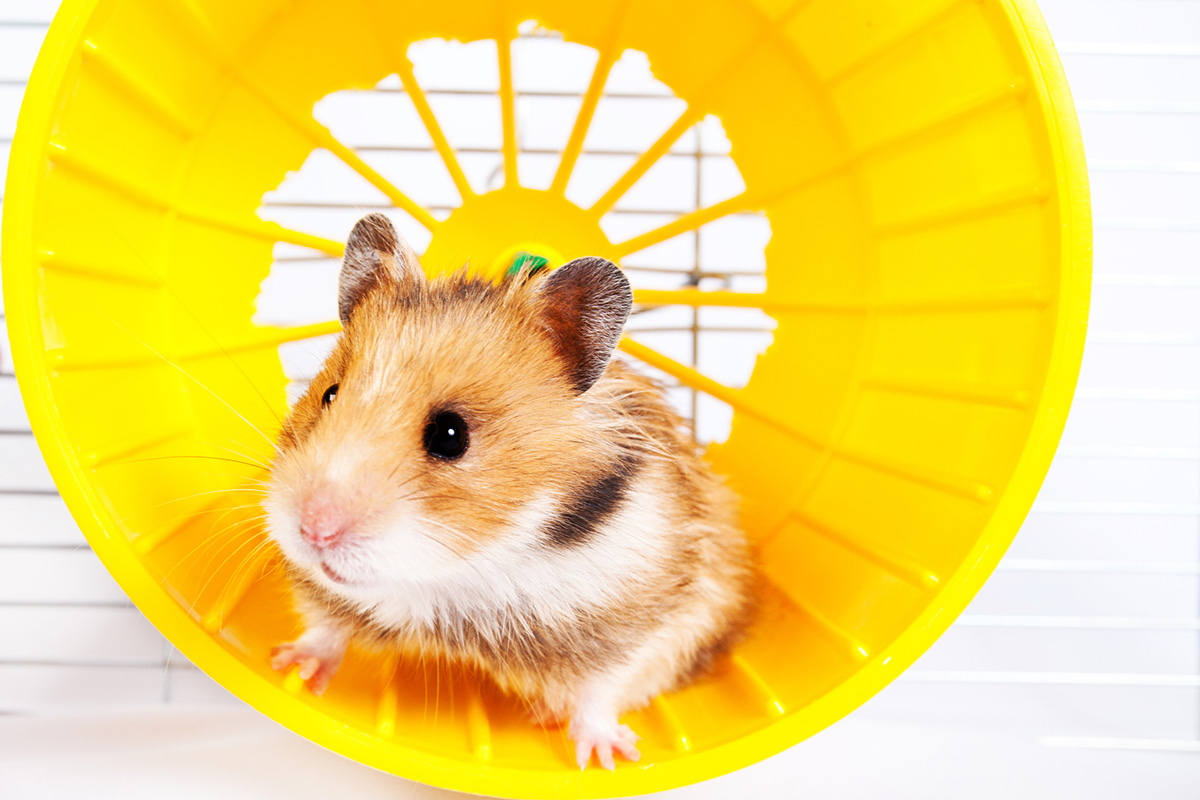 Authoring PyImageSearch’s free weekly tutorials, along with our premium books and courses, was like running on two hamster wheels at once.
Authoring PyImageSearch’s free weekly tutorials, along with our premium books and courses, was like running on two hamster wheels at once.
All that said, I have no interest in authoring books and courses again. Creating content for PyImageSearch was like running on two hamster wheels:
- One hamster wheel was creating our weekly tutorials, which were used to drive traffic via Google. People landed on our site via Google search, opt-ed in to our email newsletter, and from there, we pitched them our premium training materials.
- The second hamster wheel was authoring the paid materials themselves, namely our premium books and courses.
Subscribers trusted our free material, so it was a no-brainer to purchase the premium content.
However, after eight years of doing content creation, I burned out.
Badly.
I strongly believe PyImageSearch was successful because I maintain an extremely high standard, both for myself and other people.
I expect a lot of myself.
And I hold others to that same bar.
Details matter, and I took details very seriously.
I also have a knack for explaining extremely complex topics in a way that’s easy for people to understand, a skill that I learned from my high school AP English Teacher, Mr. Roehrle, who told me:
“It’s not enough to explain things in a way that can be understood. You need to explain them in a way that they canot be misunderstood.”
Mr. Roehrle - AP English Teacher
I’ve tried to embody that advice in nearly everything I do.
So, thank you, Mr. Roehrle — your advice literally changed my life.
However, all that content creation took a toll on me.
Running on one hamster wheel was exhausting enough…
…but having to run non-stop on a second hamster wheel left me weary, shattered, and very likely cost me my first marriage.
Emerging from a two-year writing burnout
 The burnout I felt running PyImageSearch was total and complete — I wasn’t able to author content for over two years (image credit)
The burnout I felt running PyImageSearch was total and complete — I wasn’t able to author content for over two years (image credit)
For two years, I couldn’t write.
It’s not that I didn’t try — I did.
But the ability and the drive to write just wasn’t there like it used to be.
I honestly see it as a miracle that I’m even capable of authoring content again.
Truly, it’s not something that I’ll ever take for granted again, and I will be far more defensive about my energy than I was before.
I got very, very lucky — most writers never recover from the level of burnout I experienced.
NaturalDisasters.ai won’t be monetized anytime soon (if at all)
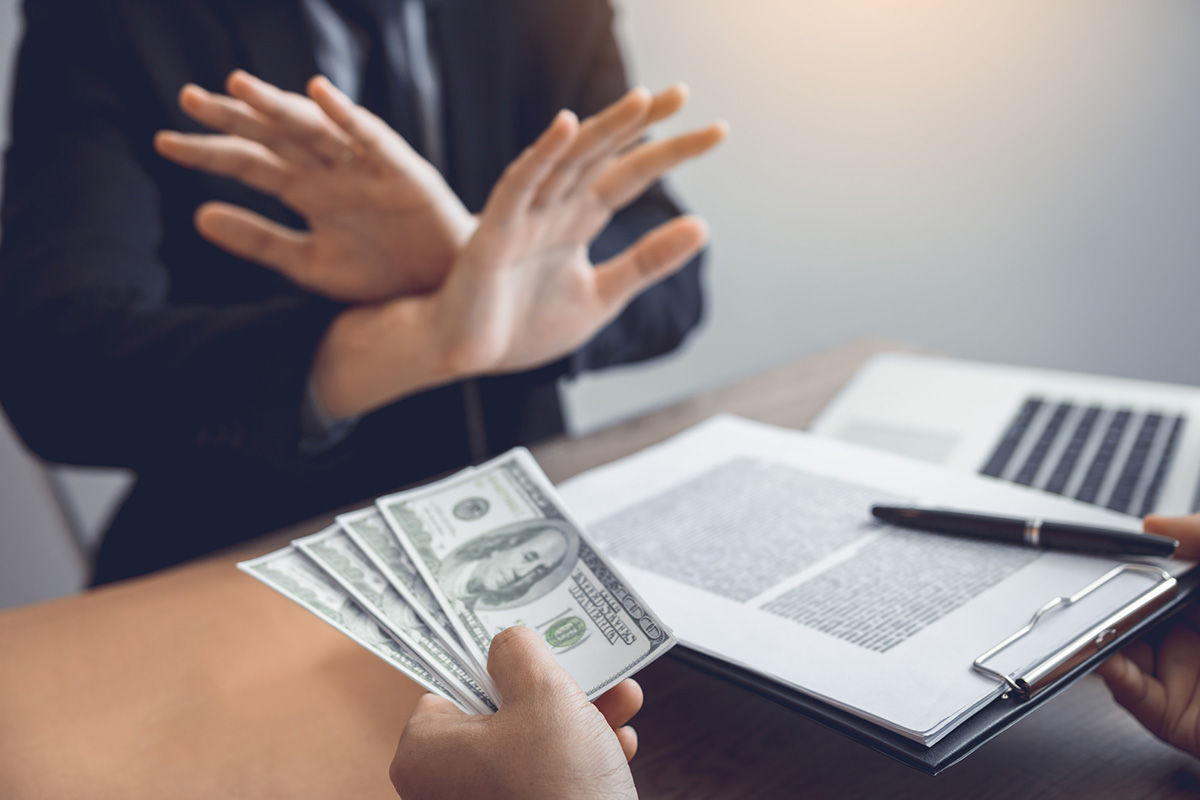
I loved PyImageSearch.
I found such profound joy in authoring free weekly tutorials to help the AI community, as well as selling my premium books and courses.
Through PyImageSearch, I learned so much about myself, and running a successful business.
But, I have to say, absolutely fuck writing another highly technical book or course in the AI space.
That was a good eight years, but the past is the past, and I have no intention of living there.
I’m moving forward.
Currently, I don’t see NaturalDisasters.ai ever being monetized.
But if I choose to monetize (emphasis on it being my personal choice), you can bet your ass that it would be monetized in a manner wildly different from anything that I’ve done previously.
- Perhaps I become an expert in the intersection of AI and natural disasters, and offer consulting services to government agencies.
- Or, maybe I provide predictive analytics as a service, sort of like a hybrid-SaaS app.
- Similarly, given my experience in AI and software development, I could help create disaster simulation software that environmental groups use to model disaster events, resource allocations, outcomes, etc.
The point is that I won’t be going back to authoring books and courses.
I have no interest in running another info product/online education business.
That time of my life is over.
Let’s do something different.
A reminder to myself
I’ll wrap up this article with a reminder to myself:
So, future Adrian, if you ever consider authoring another highly technical book, give this post a good hard read and utilize your deep introspection skills.
If you’re trying to author another book/course in the AI space, you’re likely compensating, and trying to fill a hole in your life with the past nostalgia of book authoring.
Keep your eyes forward, and don’t be afraid to try something new.
Adrian Rosebrock - A Reminder to Myself
Takeaways
- My Early Entrepreneurial Spirit: From selling self-made storybooks to my parents at the age of eight, to venturing into AI-based startup ideas in college, my entrepreneurial journey started young. I’ve always valued freedom and autonomy in my work.
- Post-PyImageSearch Era: After the acquisition of PyImageSearch in September 2021, I explored multiple business ideas. While some gained traction, my heart wasn’t fully committed to any.
- The Core Mission of NaturalDisasters.ai: I started NaturalDisasters.ai as an effort to get back to the root of my passions — focusing more on the joy and purpose of the work rather than its monetary returns. Given my financial comfort, this site is not driven by a need for income but rather by a deeper purpose (see my About page for more details on my mission).
- Addressing My Own Monetary Scarcity: Growing up in a family where finances were a point of contention has influenced my perceptions about money. It’s essential to differentiate between genuine financial needs and internalized feelings of scarcity. I’ll be publishing an entire article on my battles with money scarcity in a few weeks.
- Finding My Next “Why”: While I deeply desire to build another business, two critical components are missing. First, I recognize my need for rest and recovery. Second, I am still in search of the driving passion or “why” for my next endeavor.
- NaturalDisasters.ai and Monetization: As someone who enjoys building and monetizing products, the urge to monetize NaturalDisasters.ai will undoubtedly arise. However, I’m committed to keeping the platform personal and non-commercial for now, focusing on assisting those affected by natural disasters using my AI expertise.
- Gratitude for PyImageSearch’s New Management: I hold profound respect for the new owners of PyImageSearch, and damaging the company or its reputation is far from my intentions. I have no doubt that there is the possibility of collaboration in the future.
- PyImageSearch’s Genesis and Growth: PyImageSearch, which began as a means to self-educate and hone my entrepreneurial skills, exceeded all expectations in its success. The story of its creation highlights the importance of recognizing and addressing personal and professional gaps.
- The Significance of Passion: The success of PyImageSearch can be attributed to my genuine passion and dedication to the project. I sense a similar passion budding with NaturalDisasters.ai, suggesting its potential to create a significant impact, regardless of its monetization status.
While the future of NaturalDisasters.ai remains undetermined in terms of monetization, its core essence is to serve a purpose much larger than financial gains.
As I continue my journey, the focus remains on rediscovering my “why” and creating meaningful impact.
Adrian Rosebrock. “Will NaturalDisasters.ai Ever Be Monetized?”, NaturalDisasters.ai, 2023, https://naturaldisasters.ai/posts/naturaldisasters-ai-monetization/.
@incollection{ARosebrock_NaturalDisastersAIMonetization,
author = {Adrian Rosebrock},
title = {Will NaturalDisasters.ai Ever Be Monetized?,
booktitle = {NaturalDisasters.ai},
year = {2023},
url = {https://naturaldisasters.ai/posts/naturaldisasters-ai-monetization/},
}
AI generated content disclaimer: I’ve used a sprinkling of AI magic in this blog post, namely in the “Takeaways” section, where I used AI to create a summary of this article. Don’t fret, my human eyeballs have read and edited every word of the AI generated content, so rest assured, what you’re reading is as accurate as I possibly can make it. If there are any discrepancies or inaccuracies in the post, it’s my fault, not that of our machine assistants.
Header photo by Jason Leung on Unsplash
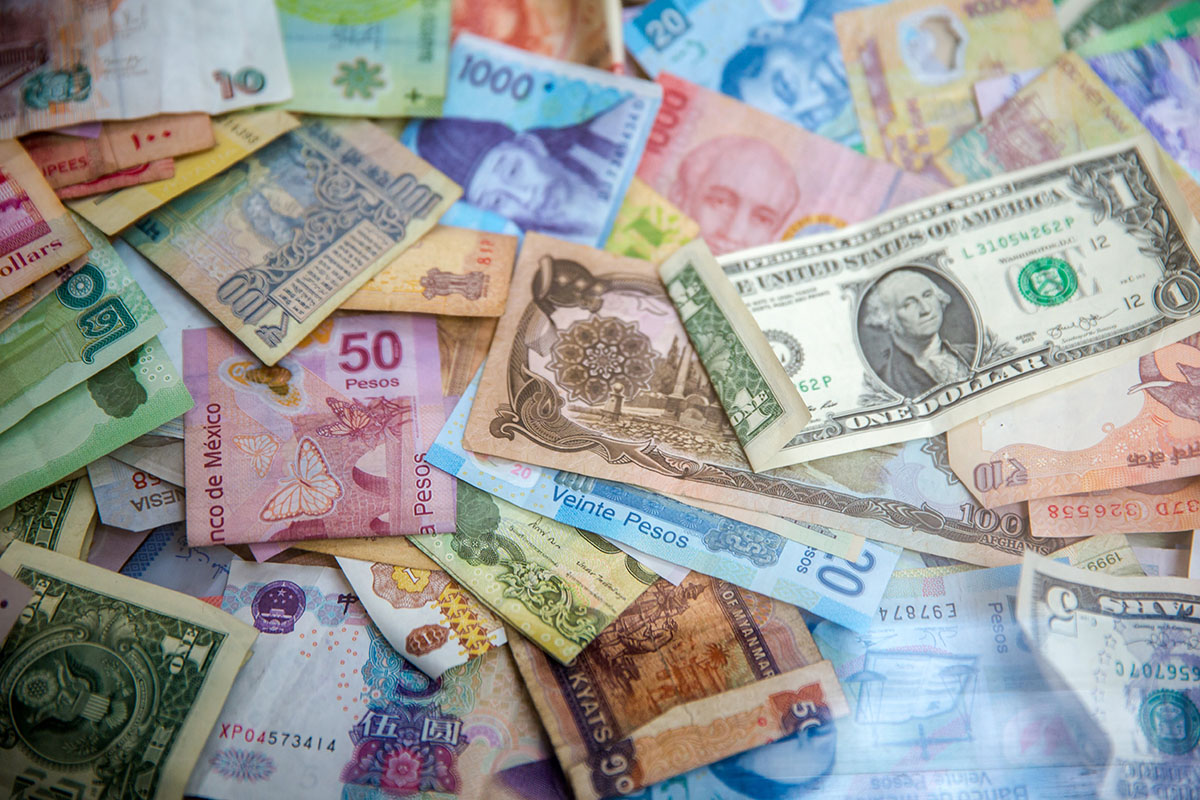
 I have yet to find my next passion (
I have yet to find my next passion (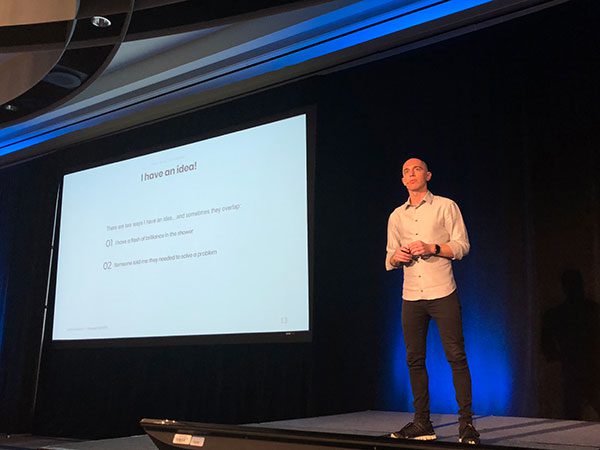



 The
The  Myself next to
Myself next to  Authoring PyImageSearch’s free weekly tutorials, along with our premium books and courses, was like running on two hamster wheels at once.
Authoring PyImageSearch’s free weekly tutorials, along with our premium books and courses, was like running on two hamster wheels at once. The burnout I felt running PyImageSearch was total and complete — I wasn’t able to author content for over two years (
The burnout I felt running PyImageSearch was total and complete — I wasn’t able to author content for over two years (
